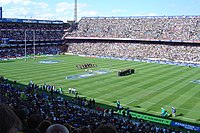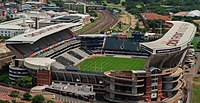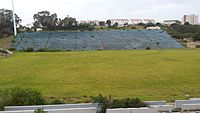1995 Rugby World Cup
Marc Ellis (7 tries each) | |
|---|---|
← 1991 → |
The 1995 Rugby World Cup (
The World Cup was the first major sporting event to take place in South Africa following the end of
In the
Qualifying
| Africa | Americas | Europe | Oceania/Asia |
|---|---|---|---|
|
|
The eight quarter-finalists from the
Squads
Referees
Venues
The 1995 tournament was the first Rugby World Cup to be hosted by just one country, and thus, all the venues are within the one country. South Africa were given the rights to host the tournament in 1993, after a meeting between the IRB and both the government led by F. W. de Klerk and the African National Congress.[1] In total, nine stadiums were used for the World Cup, most being owned by local municipalities, and the majority of the venues were upgraded prior to the tournament. Six of the nine stadiums were South African Test grounds. The four largest stadiums were used for the finals, with the final taking place at Johannesburg's Ellis Park.
There were games originally scheduled to have been played in Brakpan, Germiston, Pietermaritzburg and Witbank, but these games were reallocated to other venues. This reduced the number of venues from 14 to 9. The reasons cited for this change had to do with facilities for both the press and spectators, as well as the security. The change in the itinerary occurred in January 1994. Further changes occurred in April, so that evening games were played at stadiums with good floodlighting. It is also thought that Potchefstroom was an original venue.
Venues were paired:
- Pool 1: Cape Town, Port Elizabeth and Stellenbosch
- Pool 2: Durban and East London
- Pool 3: Johannesburg and Bloemfontein
- Pool 4: Pretoria and Rustenburg
| Johannesburg | Pretoria | Cape Town | |||
|---|---|---|---|---|---|
| Ellis Park | Loftus Versfeld | Newlands | |||
| Capacity: 60,000 | Capacity: 50,000 | Capacity: 50,000 | |||

|

|

| |||
| Durban | Bloemfontein | Port Elizabeth
| |||
| Kings Park Stadium | Free State Stadium | Boet Erasmus Stadium | |||
| Capacity: 50,000 | Capacity: 40,000 | Capacity: 38,950 | |||

|

|

| |||
| Rustenburg | East London | Stellenbosch | |||
| Olympia Park | Basil Kenyon Stadium | Danie Craven Stadium | |||
| Capacity: 30,000 | Capacity: 22,000 | Capacity: 16,000 | |||
Pools & format
| Pool A | Pool B | Pool C | Pool D |
|---|---|---|---|
The tournament was contested by 16 nations using the same format that was used in
Points system
The points system that was used in the pool stage was unchanged from 1991:
- 3 points for a win
- 2 points for a draw
- 1 point for playing
Knockout stage
Pool winners were drawn against opposite pool runners-up in the quarter-finals. For example, the winner of A faces the runner up of B, and the winner of B face the runner-up of A. The whole finals stage adopts a knock-out format, and the winners of the quarter-finals advance to the semi-finals, where winner 1 faces winner 2, and winner 3 faces winner 4. The winners advance to the final, and the losers contest a third/fourth place play-off two days before the final.
A total of 32 matches (24 pool stage & 8 knock-out) were played throughout the tournament over 30 days from 25 May to 24 June 1995.
Pool stage
Pool A
| Pos | Team | Pld | W | D | L | PF | PA | PD | Pts |
|---|---|---|---|---|---|---|---|---|---|
| 1 | 3 | 3 | 0 | 0 | 68 | 26 | +42 | 9 | |
| 2 | 3 | 2 | 0 | 1 | 87 | 41 | +46 | 7 | |
| 3 | 3 | 1 | 0 | 2 | 45 | 50 | −5 | 5 | |
| 4 | 3 | 0 | 0 | 3 | 14 | 97 | −83 | 3 |
| 25 May 1995 |
| South Africa | 27–18 | |
| Try: Hendriks 37' m Stransky 63' c Con: Stransky (1/2) 64' Pen: Stransky (4/4) 5', 21', 29', 45' Drop: Stransky (1/3) 49' | Report | Try: Lynagh 33' c Kearns 78' m Con: Lynagh (1/2) 34' Pen: Lynagh (2/3) 3', 17' |
| Newlands, Cape Town Attendance: 44,778 Referee: Derek Bevan (Wales) |
| 26 May 1995 |
New Zealand ) |
| 30 May 1995 |
Johnson (3) | Try: Gurănescu Pen: Ivanciuc |
| Newlands, Cape Town Attendance: 45,000 Referee: Ken McCartney (Scotland) |
| 31 May 1995 |
| ) |
| 3 June 1995 |
| Australia | 42–3 | |
| Try: Smith Wilson Roff (2) Foley Burke Con: Burke (2) Eales (4) | Pen: Ivanciuc |
| Danie Craven Stadium, Stellenbosch Attendance: 15,542 Referee: Naoki Saito (Japan) |
| 3 June 1995 |
| ) |
Pool B
| Pos | Team | Pld | W | D | L | PF | PA | PD | Pts |
|---|---|---|---|---|---|---|---|---|---|
| 1 | 3 | 3 | 0 | 0 | 95 | 60 | +35 | 9 | |
| 2 | 3 | 2 | 0 | 1 | 96 | 88 | +8 | 7 | |
| 3 | 3 | 1 | 0 | 2 | 69 | 94 | −25 | 5 | |
| 4 | 3 | 0 | 0 | 3 | 69 | 87 | −18 | 3 |
| 27 May 1995 |
| ) |
| 27 May 1995 |
| Argentina | 18–24 | |
| Try: Arbizu Noriega Con: Arbizu Pen: Arbizu (2) | Pen: Andrew (6) Drop: Andrew (2) |
| Kings Park Stadium, Durban Attendance: 35,000 Referee: Jim Fleming (Scotland) |
| 30 May 1995 |
New Zealand ) |
| 31 May 1995 |
| England | 27–20 | |
| Try: R. Underwood T. Underwood Con: Andrew Pen: Andrew (5) | Try: Cuttitta Vaccari Con: Dominguez (2) Pen: Dominguez (2) |
| Kings Park Stadium, Durban Attendance: 45,093 Referee: Stephen Hilditch (Ireland) |
| 4 June 1995 |
| ) |
| 4 June 1995 |
| England | 44–22 | |
| Try: R. Underwood (2) Back Penalty try Con: Callard (3) Pen: Callard(5) Drop: Catt | Try: Sini (2) Umaga Con: Fa'amasino (2) Pen: Fa'amasino |
| Kings Park Stadium, Durban Attendance: 35,000 Referee: Patrick Robin (France) |
Pool C
| Pos | Team | Pld | W | D | L | PF | PA | PD | Pts |
|---|---|---|---|---|---|---|---|---|---|
| 1 | 3 | 3 | 0 | 0 | 222 | 45 | +177 | 9 | |
| 2 | 3 | 2 | 0 | 1 | 93 | 94 | −1 | 7 | |
| 3 | 3 | 1 | 0 | 2 | 89 | 68 | +21 | 5 | |
| 4 | 3 | 0 | 0 | 3 | 55 | 252 | −197 | 3 |
| 27 May 1995 |
Australia ) |
| 31 May 1995 |
| Try: Latu Izawa Hirao Takura Con: Yoshida (4) |
| Free State Stadium, Bloemfontein Attendance: 15,000 Referee: Stef Neethling (South Africa) |
| 31 May 1995 |
| Pen: N. Jenkins (2) Drop: N. Jenkins |
| Ellis Park, Johannesburg Attendance: 45,000 Referee: Ed Morrison (England) |
| 4 June 1995 |
| Japan | 17–145 | |
| Try: Kajihara (2) Con: Hirose (2) Pen: Hirose | Report | Try: Ellis (6) Rush (3) Wilson (3) R. Brooke (2) Osborne (2) Loe Culhane Henderson Dowd Ieremia Con: Culhane (20) |
| Free State Stadium, Bloemfontein Attendance: 25,000 Referee: George Gadjovic (Canada) |
| 4 June 1995 |
Ian Rogers (South Africa ) |
Pool D
| Pos | Team | Pld | W | D | L | PF | PA | PD | Pts |
|---|---|---|---|---|---|---|---|---|---|
| 1 | 3 | 3 | 0 | 0 | 114 | 47 | +67 | 9 | |
| 2 | 3 | 2 | 0 | 1 | 149 | 27 | +122 | 7 | |
| 3 | 3 | 1 | 0 | 2 | 44 | 90 | −46 | 5 | |
| 4 | 3 | 0 | 0 | 3 | 29 | 172 | −143 | 3 |
| 26 May 1995 |
Western Samoa ) |
| 29 May 1995 |
| France | 54–18 | |
| Try: Lacroix (2) Benazzi Téchoueyres Viars Accoceberry Saint-André Costes Con: Deylaud (2) Lacroix (2) Pen: Lacroix (2) | Try: Soulama Camara Con: Kouassi Pen: Kouassi (2) |
| Olympia Park, Rustenburg Attendance: 10,000 Referee: Han Moon-Soo (South Korea) |
| 29 May 1995 |
Australia ) |
Three minutes into the match between Ivory Coast and Tonga, the Ivorian winger Max Brito was crushed beneath several other players, leaving him paralysed below the neck.[3]
| 3 June 1995 |
Australia ) |
Knockout stage
| Quarter-finals | Semi-finals | Final | ||||||||
| 10 June – Johannesburg | ||||||||||
| 42 | ||||||||||
| 17 June – Durban | ||||||||||
| 14 | ||||||||||
| 19 | ||||||||||
| 10 June – Durban | ||||||||||
| 15 | ||||||||||
| 36 | ||||||||||
| 24 June – Johannesburg | ||||||||||
| 12 | ||||||||||
| 15 | ||||||||||
| 11 June – Cape Town | ||||||||||
| 12 | ||||||||||
| 25 | ||||||||||
| 18 June – Cape Town | ||||||||||
| 22 | ||||||||||
Pretoria | ||||||||||
| 45 | Third place | |||||||||
Pretoria | ||||||||||
| 30 | ||||||||||
| 19 | ||||||||||
| 9 | ||||||||||
Quarter-finals
| 10 June 1995 |
| France | 36–12 | |
| Try: Saint-André 79' c Ntamack 80' m Con: Lacroix (1/2) 80' Pen: Lacroix (8) 7', 19', 30', 40', 49', 51', 71', 73' | Report | Pen: Elwood (4) 4', 15', 23', 39' |
| Kings Park Stadium, Durban Attendance: 20,000 Referee: Ed Morrison (England) |
| 10 June 1995 |
Johnson (2) | Try: Tatupu Nu'uali'itia Con: Fa'amasino (2) |
| Ellis Park, Johannesburg Attendance: 54,169 Referee: Jim Fleming (Scotland) |
| 11 June 1995 |
New Zealand ) |
| 11 June 1995 |
| ) |
Semi-finals
| 17 June 1995 |
| South Africa | 19–15 | |
| Try: Kruger Con: Stransky Pen: Stransky (4) | Pen: Lacroix (5) |
| Kings Park Stadium, Durban Attendance: 49,773 Referee: Derek Bevan (Wales) |
| 18 June 1995 |
| England | 29–45 | |
| Try: Carling (2) R. Underwood (2) Con: Andrew (3) Pen: Andrew | Report | Try: Lomu (4) Kronfeld Bachop Con: Mehrtens (3) Pen: Mehrtens Drop: Z. Brooke Mehrtens |
| Newlands, Cape Town Attendance: 43,414 Referee: Stephen Hilditch (Ireland) |
Third-place play-off
| 22 June 1995 |
New Zealand ) |
Final
The final was contested by New Zealand and hosts South Africa. Both nations finished undefeated at the top of their pools. South Africa defeated Western Samoa in the quarter-finals, and then France in the semi-finals to reach the final; New Zealand defeated Scotland in the quarter-finals, and England in the semi-finals, a game in which
South Africa led 9–6 at half time, and New Zealand levelled the scores at 9–9 with a drop goal in the second half. Though Andrew Mehrtens almost kicked a late drop goal for the All Blacks, the score remained tied at full-time, forcing the game into extra time. Both teams scored penalty goals in the first half of extra time, but Joel Stransky then scored a drop goal to win the final for South Africa.
What happened after the match has become an iconic moment in the history of the sport.
| 24 June 1995 |
a.e.t.) | ||
| Pen: Stransky (3) Drop: Stransky (2) | Report | Pen: Mehrtens (3) Drop: Mehrtens |
| Ellis Park, Johannesburg Attendance: 59,870 Referee: Ed Morrison (England) |
Statistics
The tournament's top point scorer was France's Thierry Lacroix, who scored 112 points. Marc Ellis and Jonah Lomu, both of New Zealand, scored the most tries, with seven each.
| Player | Team | Position | Played | Tries | Conversions | Penalties | Drop goals | Total points |
|---|---|---|---|---|---|---|---|---|
| Thierry Lacroix | Fly-half
|
6 | 4 | 7 | 26 | 0 | 112 | |
| Gavin Hastings | Full-back
|
4 | 5 | 14 | 17 | 0 | 104 | |
| Andrew Mehrtens | First five-eighth
|
5 | 1 | 14 | 14 | 3 | 84 | |
| Rob Andrew | Fly-half
|
5 | 0 | 5 | 20 | 3 | 79 | |
| Joel Stransky | Fly-half
|
5 | 1 | 4 | 13 | 3 | 61 | |
| Michael Lynagh | Fly-half
|
3 | 2 | 5 | 9 | 0 | 47 | |
| Simon Culhane | First five-eighth
|
1 | 1 | 20 | 0 | 0 | 45 | |
| Neil Jenkins | Fly-half
|
3 | 0 | 7 | 8 | 1 | 41 | |
| Diego Domínguez | Fly-half
|
3 | 1 | 5 | 7 | 1 | 39 | |
| Marc Ellis | Wing
|
5 | 7 | 0 | 0 | 0 | 35 | |
| Jonah Lomu | Wing
|
5 | 7 | 0 | 0 | 0 | 35 |
Broadcasters
The event was broadcast in
Commemorative coins
The South African Mint issued a one-ounce gold proof "Protea" coin with a total mintage of 406 pieces to commemorate the event being hosted by South Africa.
Popular culture
Mandela and Pienaar's involvement in the World Cup is the subject of the John Carlin book Playing the Enemy: Nelson Mandela and the Game That Made a Nation, its 2009 film adaptation Invictus, and the ESPN TV documentary The 16th Man in 2010.
References
- ISBN 978-1594201745.
- ^ a b c d "1995 (South Africa)". 25 September 2003. Retrieved 16 October 2023.
- ^ Irwin, Pirate (4 October 2007). "Max Brito at end of tether after 12-year struggle". Mail & Guardian. Retrieved 9 January 2010.
- ^ Rugby World Cup 1995: Quarter Final - New Zealand v Scotland. YouTube.com. World Rugby. 17 April 2020. Retrieved 19 January 2022.
- ^ "Rugby World Cup history". BBC. 7 October 2003. Retrieved 7 October 2006.
External links
| External videos | |
|---|---|
YouTube |

